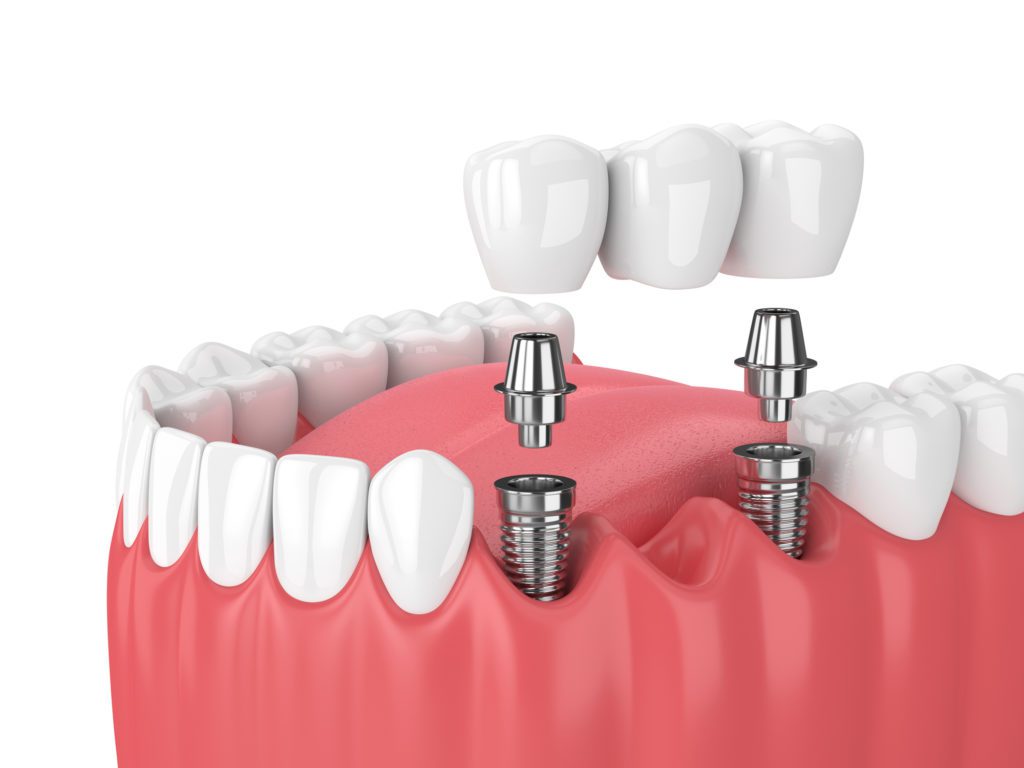Are you missing multiple permanent teeth or a single tooth? Wayne Family Dentistry offers restorative dentistry treatments to replace your missing teeth including a dental bridge in Wayne, PA. A dental bridge is a prosthetic dental restoration that your dentist can anchor in place to adjacent teeth or dental implants. It is a single until prosthesis that consists of pontics, which are the false teeth, and dental crowns. The crowns are located on each end and will be anchored to the adjacent teeth or implant fixtures. The bridge will close the gap created by your missing teeth. This is a popular dental treatment that will restore the functionality of your mouth, prevent misalignment, and fill in the gaps in your smile.

We Offer Several Types of Dental Bridges
There are several types of dental bridges available to meet the varying needs of our patients. Although a traditional dental bridge offers a quick treatment for tooth loss, we will suggest using an implant-secured dental bridge for multiple missing teeth. For patients missing a single tooth, we also offer implant supported crowns. Here, we review the different types of dental bridges we offer:
- Traditional Fixed Bridge: A traditional bridge is a common dental restoration dentist use to replace one tooth as well as several consecutive missing teeth. It is made up of a pontic that will replace the tooth and is held in place with dental crowns. The crowns are cemented to adjacent, remaining teeth that will need to be prepared.
- Implant-Supported Bridge: For patients that qualify, we will suggest using dental implants to anchor the dental bridge in place. An implant-supported bridge is for patients who have several consecutive missing teeth. The bridge is made up of several pontics that will fill in the gaps and the dental crowns. The crowns will be secured to the dental implants instead of healthy, remaining teeth.
- Cantilever Bridge: Similar to a traditional fixed bridge, a cantilever bridge will rely on traditional teeth to secure it in place. However, it is for patients who only have one healthy tooth available. Since it is only secured to a single tooth, it is less stable than a traditional fixed bridge.
- Resin-Bonded Bridge: Called a Maryland dental bridge, this dental restoration is primarily used to replace front teeth. It involves bonding one pontic to adjacent teeth with metal or porcelain wings. It is a less invasive option but may not be as durable.
Traditional Fixed Bridge vs Implant-Secured Dental Bridge
Fixed dental bridges are false teeth that are secured by natural abutment teeth. This type of dental bridge is supported by dental crown-capped natural teeth. However, traditional fixed bridges do not fully support the bite. Patients with traditional bridges may have dietary restrictions as it may be difficult to eat hard or chewy foods.
Implant-secured dental bridges last longer and support patients’ oral health. Dental implants are titanium screws that are surgically inserted into the bone tissue. They fully replace missing teeth and make sure that bridge prosthetics are secure. With implant bridges, patients are able to bite, chew, and even speak with renewed confidence. They help avoid bone loss in the jaw, a common side effect with tooth loss. A fixed dental bridge cannot prevent bone loss.
Treatment with Implant-Secured Dental Bridges
Before treatment, we will need to make sure that patients have enough bone tissue to support their dental implants. If needed, we may recommend bone grafting services. Bone grafting takes bone tissue from a different part of the mouth and places it where it is required. Then, to make sure that the dental bridges are secure and healthy, we can also provide gum disease treatment.
We will take digital impressions to create the bridge prosthetic. Then, our oral surgeon will place the dental implants in key areas of the mouth to support the bridge. Once the implants have healed, we will place the permanent dental bridge.
How to Care for Your Dental Bridge
To ensure that your dental bridge lasts a long time and functions correctly, you must take proper care of it. Surprisingly, caring for your bridge is similar to caring for your natural teeth. We recommend doing the following:
- Brush your Teeth Daily: You need to brush your teeth at least twice a day, if not more. You should use a soft bristle toothbrush and a nonabrasive toothpaste to keep plaque from accumulating.
- Floss Daily: Flossing between your teeth and around the dental bridge is important for gum health. This includes flossing under the dental bridge to remove food and debris can get stuck there. You can use interdental brushes or other special dental tools to accomplish this.
- Regular Dental Check-ups: Regular dental visits are very important. At your dentist appointments, your dentist professionally clean your teeth and examine your dental bridge to make sure it is functioning properly. If there are any issues, we can address them promptly.
- Consume a healthy diet: Eating a healthy diet will help promote overall health. This is very important to supporting your oral health. You should limit sugary and acidic foods, as they can damage both natural teeth and the bridge.
- Avoid habits that will damage the bridge: Certain bad habits may cause you to damage your dental restoration. Things such as biting your nails, chewing on hard things like ice or popcorn kernels, and using your teeth as tools can break your dental bridge. This will lead to costly repairs.
Schedule an Appointment for a Dental Bridge in Wayne, PA
Do you want a fuller, healthier smile? Are you interested in restoring your smile with a dental bridge in Wayne, PA? Call today to schedule your restorative dentistry consultation with your dentist. You can reach us at 610-347-5133 or request an appointment online by filling out the form.
